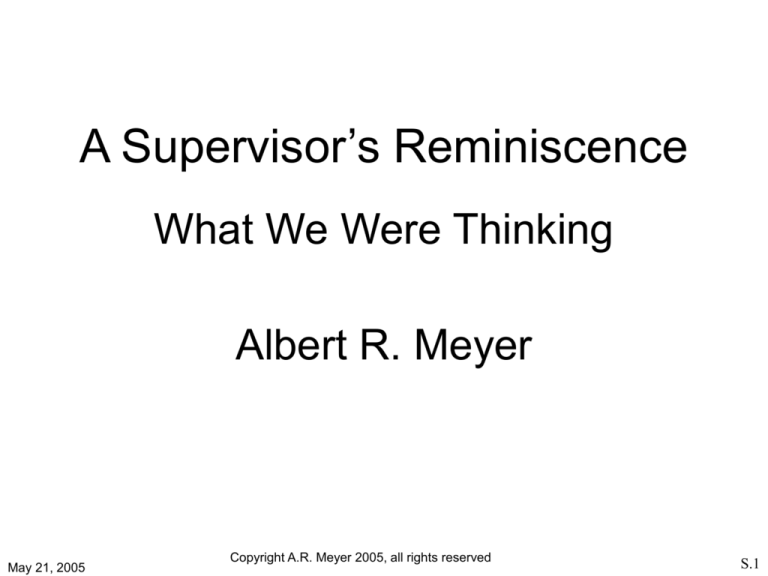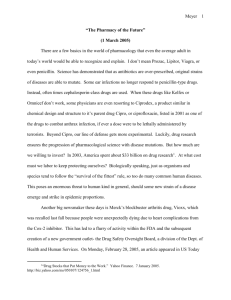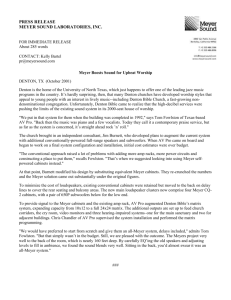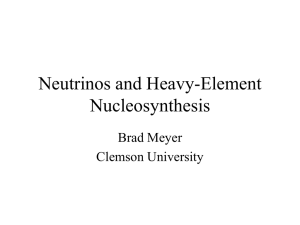
A Supervisor’s Reminiscence
What We Were Thinking
Albert R. Meyer
May 21, 2005
Copyright A.R. Meyer 2005, all rights reserved
S.1
My concerns '67-'72:
(1) Was speedup ``real'' -- any sets with
speedup not explicitly constructed (by
diagonalization) to have it?
(2) Was there any ``real'' problem that was
definitely not in P?
(3) How to defend a complexity theory
which treated all finite problems
as trivial?
May 21, 2005
Copyright A.R. Meyer 2005, all rights reserved
S.2
Larrys' thesis provided definitive
answers to all these questions.
May 21, 2005
Copyright A.R. Meyer 2005, all rights reserved
S.3
A neat, but overlooked,
result from Larry's thesis.
May 21, 2005
Copyright A.R. Meyer 2005, all rights reserved
S.4
Language L has
IO-speedup
if, when M accepts L, then
9 M' accepting L, and
M' is very fast at 1‘ly many
inputs where M is slow,
(same time on other inputs)
May 21, 2005
Copyright A.R. Meyer 2005, all rights reserved
S.5
Pretty much all the
problems known to be
complete for the usual time
and space bounded
complexity classes have
corresponding IO-speedup.
May 21, 2005
Copyright A.R. Meyer 2005, all rights reserved
S.6
Cor: Let SF :=
{star-free reg. exps R
| L(R) = ;}
SF has
2…n
2
2
-IO-speedup
May 21, 2005
Copyright A.R. Meyer 2005, all rights reserved
S.7
Definition: Let M be a program,
x an input word, f(n) a time fcn.
Say “M(x) is slow” if
on input x,
M takes > f(|x|) steps.
May 21, 2005
Copyright A.R. Meyer 2005, all rights reserved
S.8
Definition: Let M be a program,
x an input word, f(n) a time fcn.
Say “M(x) is very fast” if
on input x,
M takes O(|x|) steps
(that is, linear time)
May 21, 2005
Copyright A.R. Meyer 2005, all rights reserved
S.9
Thm [Blum, McCreight-Meyer]
Let Df :=
{M | M rejects input “M”
or takes > f(|M|) steps}
Then Df has f-IO-speedup.
May 21, 2005
Copyright A.R. Meyer 2005, all rights reserved
S.11
That is, M 2 Df iff
M rejects "M "
or is slow on it.
May 21, 2005
Copyright A.R. Meyer 2005, all rights reserved
S.12
Pf: Suppose Df = L(M0). So
M0 accepts "M " iff
M rejects "M " or is slow on it.
So, letting M be M0,
M0 accepts “M0,”
but slowly.
May 21, 2005
Copyright A.R. Meyer 2005, all rights reserved
S.13
Cool Trick: let M0,n be same
as M0 but padded with n
useless instructions.
So M0,n behaves exactly like
M0, just bigger.
May 21, 2005
Copyright A.R. Meyer 2005, all rights reserved
S.14
So M0,n accepts "M0,n” slowly,
so M0 accepts "M0,n” slowly.
Define M0' to accept "M0,n”
very fast for all n,
otherwise, same as M0.
M0’ speeds up M0.
QED
May 21, 2005
Copyright A.R. Meyer 2005, all rights reserved
S.15
Lemma [Meyer/Stockmeyer]
IO-speedup inherits up
“efficient invertible“ reducibility.
May 21, 2005
Copyright A.R. Meyer 2005, all rights reserved
S.16
r is "good" if it is 1-1, linear-bounded,
"easy to compute," and the same for
r -1.
If A has f-IO-speedup,
and x 2 A iff r(x) 2 B,
then B has (f )-IOspeedup
May 21, 2005
Copyright A.R. Meyer 2005, all rights reserved
S.17
The story behind the SF result
My Background from Harvard ’62-‘67:
Recursion theory from Rogers & P. Fischer
·m, arithmetic hierarchy
Complexity thy: Rabin, Hartmanis-Stearns, Blum
Speedup, compression, IO and AE
Finite Automata: S. Even, Ginsburg
Krohn-Rhodes on star-free events
Automata & Logic: Wang, Buchi
WS1S just another notation for FA’s
May 21, 2005
Copyright A.R. Meyer 2005, all rights reserved
S.18
Efficient reducibility:
McCreight's thesis, CMU '68
Circuit complexity:
Winograd, Ehrenfeucht
Cook & Karp '72
Polytime ·:
NP as 9 polysize x
May 21, 2005
Copyright A.R. Meyer 2005, all rights reserved
S.19
With this background, not surprising that
I should propose a polytime
analog of the arithmetic hierarchy.
But I wanted to show it was useful for
classifying problems.
Suggested to Larry that he fit reg.exp.
equivalence into the hierarchy.
May 21, 2005
Copyright A.R. Meyer 2005, all rights reserved
S.20
Larry came back (next day?) and said
reg.exp. equiv NOT IN the hierarchy!
He showed me how to reduce every
poly-class to reg.exp. equiv.
I pointed out that all he was using
about poly-classes was they were in
polyspace. He had shown reg.exp.
equiv. was poly-space hard!
May 21, 2005
Copyright A.R. Meyer 2005, all rights reserved
S.21
Driving home I started thinking ``why
polynomial?'‘
Realized the crux was a linear size
expression for set of all length n
strings.
May 21, 2005
Copyright A.R. Meyer 2005, all rights reserved
S.22
I knew how to get a nondeterministic FA
to recognize all strings differing from
the sequence of all consecutive n-bit
strings. So with complement and a
“smoothing” operation to turn one long
string into all long strings, I could get a
linear size expression for length 2n
strings, and could iterate the construction
to get super-exponential lower bounds on
reg-exps with complement & smoothing.
May 21, 2005
Copyright A.R. Meyer 2005, all rights reserved
S.23
And the equiv. prob for these
expressions was easy to reduce to
the decidable logical theory WS1S,
so it too had super-exponential
lower bound.
WOW!
May 21, 2005
Copyright A.R. Meyer 2005, all rights reserved
S.24
I called Mike Fischer (around midnight) to tell
him what I'd figured out (and to make sure I
wasn't kidding myself). Next day(?) I
explained it to Larry and suggested he work
on getting rid of the ad hoc ``smoothing''
operation. Later he got rid of ``star'' too.
We were off and running.
May 21, 2005
Copyright A.R. Meyer 2005, all rights reserved
S.25






